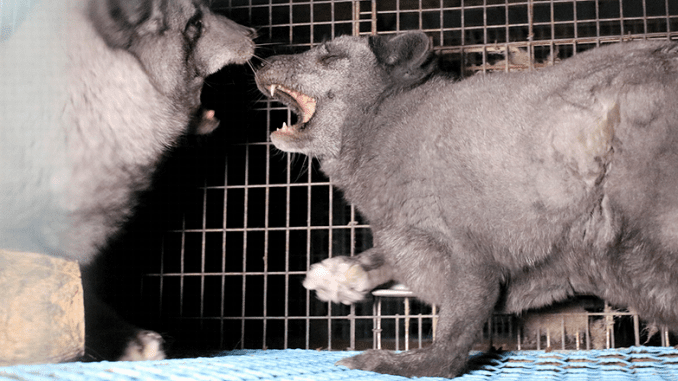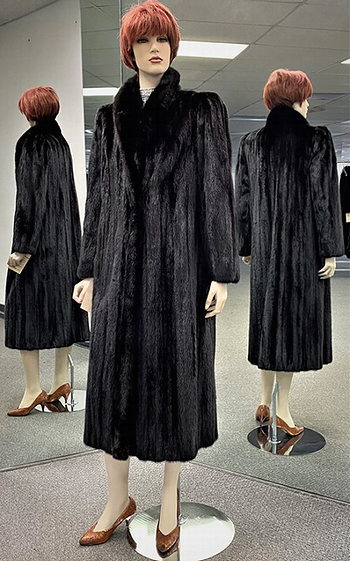
ROME, Italy, December 21, 2021 (ENS) – The Budget Committee of the Italy’s Senate today voted to approve an amendment to the budget law which will see the country’s 10 remaining mink fur farms closed within six months and a permanent ban on fur farming throughout Italy.
The approved measure includes:
• An immediate ban on breeding of fur-bearing animals including mink, foxes, raccoon dogs and chinchillas, and the closure of all active fur farms in Italy by June 30, 2022.
• Compensation for farmers, covered by a fund from the Ministry of Agriculture for a total of €3 million (US$3.4 million) in 2022.
Although the decision requires final approval by the full Parliament, this is expected to go through. When it does, Italy will become the 16th country in Europe to ban fur farming. Many Italian designers have already gone fur-free including Armani, GUCCI, Prada, Valentino, and Versace.
The committee vote follows discussions with animal protection organization Humane Society International/Europe which presented practical, strategic solutions to close and convert fur farms into alternative, humane and sustainable businesses in its recent report, “Mink breeding in Italy: Mapping and future perspectives.” (In Italian)

Humane Society International/Europe’s fur farm conversion proposal, which sought an end to fur farming due to animal cruelty and public health risks from zoonotic diseases, was endorsed by Italian Member of Parliament Michela Vittoria Brambilla, who launched the political action to implement the conversion strategy with existing public funds, and Senator Loredana De Petris who formally submitted the amendment.
Martina Pluda, director of Humane Society International in Italy, said, “This is an historic victory for animal protection in Italy, and HSI/Europe is immensely proud that our fur farm conversion strategy has played a central role in dismantling this cruel and dangerous industry in our country. There are very clear economic, environmental, public health and of course animal welfare reasons to close and ban fur farms.”
“Today’s vote recognizes that allowing the mass breeding of wild animals for frivolous fur fashion represents a risk to both animals and people that can’t be justified by the limited economic benefits it offers to a small minority of people involved in this cruel industry,” Pluda said. “With so many designers, retailers and consumers going fur-free, conversion of fur farms offers people a sustainable future that the fur trade simply cannot provide.”
Michela Vittoria Brambilla, president of the Parliamentary Intergroup for Animal Rights and of the Italian League for the Defense of Animals and the Environment, commented on the vote, “In 30 years of animal rights battle this is the best victory. Finally, a parliamentary vote sanctions the end of unspeakable suffering inflicted on animals only in the name of profit and vanity. Italy is the 20th European country to introduce a ban or severe restriction on fur farming: better late than never.”
“A dream comes true that animal protection associations have cultivated for decades in our country,” Brambilla said. “It is a great achievement, which finally all those who love and respect animals rejoice!”
The Italian fashion house Prada stopped using fur as of its spring/summer 2020 women’s collections. Artistic Director Miuccia Prada said, “The Prada Group is committed to innovation and social responsibility, and our fur-free policy is an extension of that engagement. Focusing on innovative materials will allow the company to explore new boundaries of creative design, while meeting the demand for ethical products.”
The move was made in collaboration with the Fur Free Alliance, an international coalition of more than 40 animal protection organizations working together to end animal cruelty. Humane Society International is a coalition member.
France Quits Fur Farming
Fur farming is now a thing of the past in France. In November, the French Senate voted by an overwhelming majority in favor of legislation to end the farming of wild animals for their fur. The ban went into immediate effect and will see the two remaining French mink fur farms shut down.

Muriel Arnal from the activist nonprofit One Voice says, “There are only two mink farms left in France. But, as we requested, this ban has been expanded to all wild animals being bred for their fur. We welcome this important step forward and hope that it will inspire the countries that have not yet taken the decision to ban the exploitation of foxes, minks, chinchillas.”
“Global society is calling for this progress,” Arnal said. “It is time.”
A number of recent investigations by One Voice laid bare the cruel conditions under which animals were kept on French fur farms. The undercover footage, recorded in 2017, 2019 and in 2020, revealed animal suffering: mink with physical injuries kept in appalling conditions.
Public opposition prompted the French government last year to propose a ban on mink fur production with a phaseout period of five years.
Together with One Voice, the Fur Free Alliance urged the French government to take immediate action and shut down France’s last remaining fur farms, and that is now law. One Voice marks the celebration of this move by NGOs around the world and wants other countries to follow suit.
Joh Vinding, chairman of the Fur Free Alliance, said, “There has never been a more urgent need to end the practice of fur farming worldwide, an industry that not only treats animals inhumanely for a product no one needs, but has also been shown to be a breeding ground for outbreaks of infectious diseases such as COVID-19.”
In the past five years alone, animal welfare concerns have led eight countries to adopt legislation to end the animal cruelty on fur farms. Discussions on the prohibition of fur farming are currently being considered in Latvia, Lithuania, Spain, Ukraine and Bulgaria.
In 2021 Israel became the world’s first country to ban sales of real fur. In the United States, California became the first state to ban the sale of fur in 2019 after similar bans in San Francisco, Berkeley, Los Angeles, and West Hollywood.
Featured image: Caged furbearers in a fight caught on camera during a Humane Society International investigation at a Finnish Fur Farm. (Photo courtesy Humane Society International)



